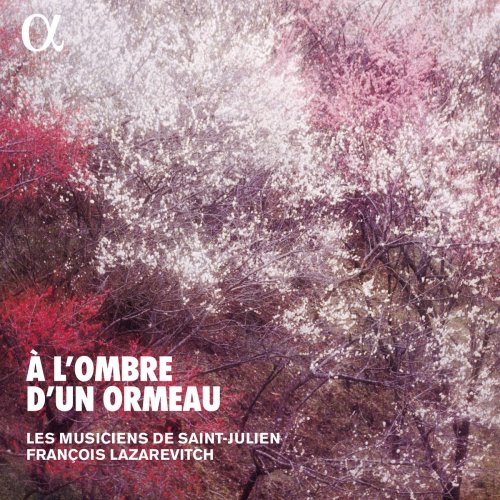
Les Musiciens de Saint-Julien, François Lazarevitch - À l'ombre d'un ormeau (Alpha Collection) (2018)
BAND/ARTIST: Les Musiciens de Saint-Julien, François Lazarevitch
- Title: À l'ombre d'un ormeau (Alpha Collection)
- Year Of Release: 2007/2018
- Label: Alpha
- Genre: Classical
- Quality: flac lossless +Booklet
- Total Time: 01:01:16
- Total Size: 327 mb
- WebSite: Album Preview
Tracklist
---------
01. Suite de trois branles de village: Bobbing Joe-Excuse Me-Red House
02. Pourquoy doux rossignol
03. Le beau berger Tircis
04. La Magnotte-La petite Jeanneton-Les 6 visages
05. J'avois crû qu'en vous aymant
06. La Furstemberg-La Royale
07. L'amour m'a fait un beau présent-Je me levé par un matin-Malbrough-La Mississipy
08. Que mon martire me seroit doux-Où êtes-vous allés mes belles amourettes-Ah! Que ces bois, ces ruisseaux, ces fontaines
09. Ballet de village No. 4 en Sol Majeur: Rondement-Gaiment-Légérement
10. Ballet de village No. 4 en Sol Majeur: Doucement-Mouvement de chaconne
11. Heureux qui peut plaire-La jeune Iris
12. La Caroline-Le sabotier
13. Dans nos bois-L'amant le plus fidèle
14. J'ai du bon tabac-Menuet d'Isis-Menuet d'Alcide-Menuet à quatre
15. Musette des Fêtes d'Hébé-À l'ombre d'un ormeau
16. La Provencalle / Tambourin des fêtes de Polymnie / La ramoneuse
This recording reflects musical life in France in the eighteenth century. Leaving aside the prestigious repertoire of vocal and instrumental works, however, Les Musiciens de Saint-Julien share with us music that played an important part, first of all, in the daily lives and musical practices of the aristocracy, before gaining much wider appeal among the Parisian middle and lower classes, so that in the end it was popular at every level of society. Everyone in eighteenth-century Paris was familiar with and fond of the songs known as brunettes and petits airs tendres. Minuets, too, their tunes borrowed from well-known operas an their words sometimes changed, and contredanses (country dances), imported from the ballrooms of England, permeated society, appealing to the lowly and to the titled alike. These pieces were not intended for passive listening, but to be played, sung, danced, and experienced on a daily basis, whenever the opportunity arose. Being appreciated throughout the various social strata, they acted, so to speak, as a common denominator- a taste and a sensitivity that were shared by all, in the French capital and beyond.
---------
01. Suite de trois branles de village: Bobbing Joe-Excuse Me-Red House
02. Pourquoy doux rossignol
03. Le beau berger Tircis
04. La Magnotte-La petite Jeanneton-Les 6 visages
05. J'avois crû qu'en vous aymant
06. La Furstemberg-La Royale
07. L'amour m'a fait un beau présent-Je me levé par un matin-Malbrough-La Mississipy
08. Que mon martire me seroit doux-Où êtes-vous allés mes belles amourettes-Ah! Que ces bois, ces ruisseaux, ces fontaines
09. Ballet de village No. 4 en Sol Majeur: Rondement-Gaiment-Légérement
10. Ballet de village No. 4 en Sol Majeur: Doucement-Mouvement de chaconne
11. Heureux qui peut plaire-La jeune Iris
12. La Caroline-Le sabotier
13. Dans nos bois-L'amant le plus fidèle
14. J'ai du bon tabac-Menuet d'Isis-Menuet d'Alcide-Menuet à quatre
15. Musette des Fêtes d'Hébé-À l'ombre d'un ormeau
16. La Provencalle / Tambourin des fêtes de Polymnie / La ramoneuse
This recording reflects musical life in France in the eighteenth century. Leaving aside the prestigious repertoire of vocal and instrumental works, however, Les Musiciens de Saint-Julien share with us music that played an important part, first of all, in the daily lives and musical practices of the aristocracy, before gaining much wider appeal among the Parisian middle and lower classes, so that in the end it was popular at every level of society. Everyone in eighteenth-century Paris was familiar with and fond of the songs known as brunettes and petits airs tendres. Minuets, too, their tunes borrowed from well-known operas an their words sometimes changed, and contredanses (country dances), imported from the ballrooms of England, permeated society, appealing to the lowly and to the titled alike. These pieces were not intended for passive listening, but to be played, sung, danced, and experienced on a daily basis, whenever the opportunity arose. Being appreciated throughout the various social strata, they acted, so to speak, as a common denominator- a taste and a sensitivity that were shared by all, in the French capital and beyond.
Year 2018 | Classical | FLAC / APE
As a ISRA.CLOUD's PREMIUM member you will have the following benefits:
- Unlimited high speed downloads
- Download directly without waiting time
- Unlimited parallel downloads
- Support for download accelerators
- No advertising
- Resume broken downloads


